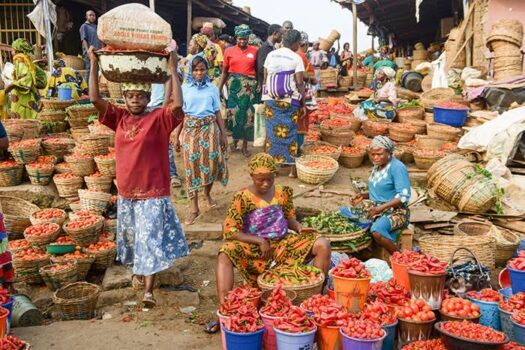
Nigeria’s headline inflation reached 32.70% in September 2024, up from 32.15% in the previous month, marking a 0.55% increase month-on-month, according to the National Bureau of Statistics (NBS). The surge in inflation was driven primarily by rising transportation costs and food prices, compounded by an increase in petrol prices since early September by the Nigerian National Petroleum Company Limited (NNPCL).
Year-on-year, the inflation rate is now 5.98 percentage points higher than the 26.72% recorded in September 2023, reflecting a significant rise in inflationary pressures over the past year. On a month-on-month basis, inflation accelerated by 2.52% in September, compared to 2.22% in August, signaling faster price increases.
Food Inflation Food inflation hit 37.77% year-on-year, up 7.13 percentage points from 30.64% in September 2023. Month-on-month, food prices increased by 2.64%, with notable hikes in the prices of local and foreign beer, vegetable oils, beef, and products like Lipton and Milo.
The average annual food inflation for the twelve months ending September 2024 stood at 37.53%, a sharp increase from the 25.65% recorded in the same period in 2023.
Core Inflation Core inflation, excluding agricultural products and energy prices, climbed to 27.43% year-on-year in September, up from 21.84% a year earlier. The biggest price hikes were observed in rent, transportation, and accommodation services. However, on a month-on-month basis, core inflation slowed slightly to 2.10% from 2.27% in August.
Urban and Rural Inflation Urban inflation rose to 2.67% in September, up from 2.39% in August, while rural inflation increased to 2.39%, compared to 2.06% in the previous month.
Nigeria continues to grapple with inflationary pressures, particularly in key sectors such as transportation and food, exacerbating the economic challenges faced by households across the country.

Supreme Court Invalidates National Lottery Act, Restricts Enforcement To FCT
House Of Reps Rejects Six-Year Single Term Bill For President, Governors
Senate Approves ₦1.77 Trillion Loan Request By President Tinubu
Finland Arrests Pro-Biafran Agitator Simon Ekpa On Terror Charges